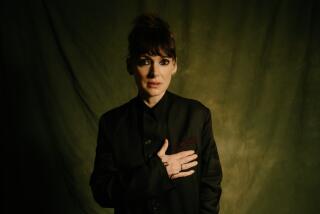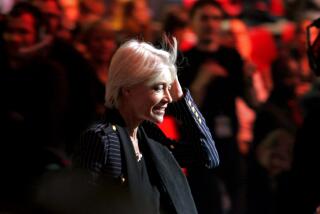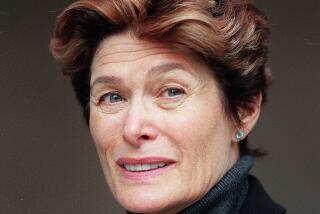Sue Ryder; Charity Group Founder Called ‘Mother Teresa of Britain’
- Share via
Sue Ryder, who founded one of Britain’s largest charities and was made a baroness for life for her dedication to helping the sick and disabled, has died.
Ryder died Thursday after a long illness at West Suffolk Hospital in Bury St. Edmonds, England. She was 77.
Called the Mother Teresa of Britain, Ryder was moved by the horrors she witnessed during World War II to establish the Sue Ryder Foundation, now called Sue Ryder Care, which runs 80 homes in Britain and Eastern Europe for the chronically ill and disabled. She later married a war hero, Leonard Cheshire, whose name became as synonymous as hers with compassionate work.
Born in Leeds, Ryder was the youngest of five children of a well-to-do family. Her mother was a driving force in her life; as a child of 7, she joined her mother working in the slums, which enabled her to observe firsthand the effects of poverty and disease. When she was 9, she was taken to see World War I graves in Flanders and France. “My mother was a very strong social worker. Her whole life was devoted to doing what she could for other people . . . and I grew up with a strong sense of conscience and a very strong religious faith,” she told the Prague Post several years ago.
When war broke out in 1939, the 16-year-old Ryder volunteered for the First Aid Nursing Yeomanry, Britain’s first women’s voluntary corps. Soon she was diverted to the Special Operations Executive, the unit established by Winston Churchill to coordinate resistance activities throughout Europe during World War II. Assigned to work as a driver and radio operator with the secret Polish Section, she ferried agents to the airfield for missions to sabotage industrial production in occupied Europe.
After the war, she did relief work, driving hundreds of miles across Poland and France to visit people who had been jailed for offenses related to hunger and poverty. Her work also took her into the concentration camps, where she met survivors of Nazi atrocities. Many years later, when she wrote her autobiography, “Child of My Love,” she refused to relive the horrors she had seen there, saying only that each place “had its own individuality, atmosphere and tradition--all foul, of course.”
She became an advocate for about 1,400 homeless Polish boys who had survived the war, only to be locked up in German jails. She won freedom and repatriation for all but four of the boys and, in 1952, opened a home for them.
By 1965, she had established 30 homes in England, Poland, Yugoslavia, Greece and Germany. She made them homes, not institutions, decorating with chintz and flowers and creating special bungalows for families. She traveled 50,000 miles a year to visit the homes and bring them supplies.
Petite, with fine features, Ryder was a Roman Catholic convert who easily could have become a nun. Immersed in her work, she had no thoughts of marriage. But a few years after opening her first home, she agreed to a colleague’s suggestion that she meet Cheshire, Britain’s most decorated World War II hero.
Cheshire was the only man to fly 100 missions over Germany and was the official British observer of the dropping of the atomic bomb on Hiroshima. Like Ryder, he had converted to Catholicism and was heavily involved in humanitarian work. He had established a foundation to care for the Hiroshima victims that later grew into a worldwide organization of 150 homes for the physically disabled.
“I think he rang me up,” Ryder recalled in an interview with the London Daily Mail in 1992. “I had no preconceived ideas about him. He was a bit younger than I thought, and rather shy. We were both shy of talking about what we were trying to do.”
It took five years of “thought and meditation” for them to decide to marry. Finally, in 1959, they became engaged while visiting the homes he had established in India and were married in a private chapel in Bombay. On their 25th anniversary in April 1984, they took 600 disabled people with them to Rome, where they renewed their vows and had a special audience with the Pope. Cheshire died in 1992, and Ryder is survived by their son, Jeremy, and daughter, Elizabeth.
In the late 1970s, when then-Prime Minister James Callaghan invited Ryder to join the British aristocracy, she at first hesitated, then made an unusual request that reflected the lifelong love of Poland that came from her wartime experience. She asked whether she could be titled Baroness Ryder of Warsaw. The request was granted in 1978.
Known for her frugality, Ryder and her husband lived on his Air Force pension in a room at the foundation’s headquarters in rural Suffolk. She continued to live there after his death, although her last years were clouded by disagreements with the foundation’s trustees. She resigned from the board of her foundation in 1998, an act she said was made under duress. Earlier this year, she established a new charity, the Bouverie Foundation, to support her homes.
Despite these troubles, her overriding concern remained alleviating the suffering of those too feeble to care for themselves. Their cause, she said, kept her going.
“They’re very beautiful,” she said. “I can’t think of any other word. The real love that comes from the heart is what I feel for them. If you’re very close to people who are dying in terrible circumstances, literally dying all around you, they become a source of strength itself.”
More to Read
Sign up for Essential California
The most important California stories and recommendations in your inbox every morning.
You may occasionally receive promotional content from the Los Angeles Times.














